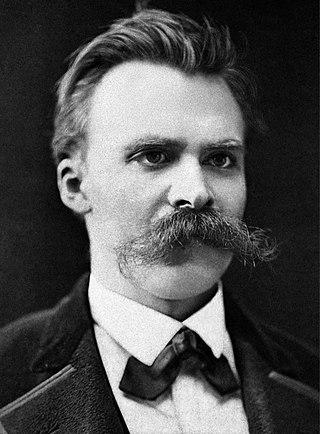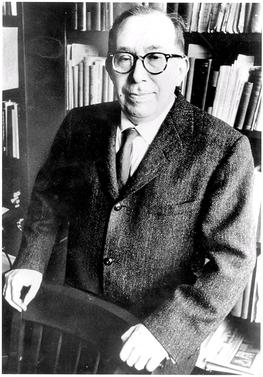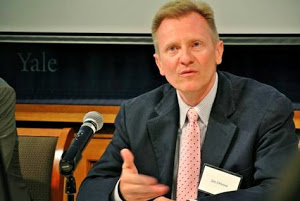Related Research Articles

Friedrich Wilhelm Nietzsche was a German classical scholar, philosopher, and critic of culture, who became one of the most influential of all modern thinkers. He began his career as a classical philologist before turning to philosophy. He became the youngest person to hold the Chair of Classical Philology at the University of Basel in Switzerland in 1869, at the age of 24, but resigned in 1879 due to health problems that plagued him most of his life; he completed much of his core writing in the following decade. In 1889, at age 44, he suffered a collapse and afterward a complete loss of his mental faculties, with paralysis and probably vascular dementia. He lived his remaining years in the care of his mother until her death in 1897, and then with his sister Elisabeth Förster-Nietzsche. Nietzsche died in 1900, after experiencing pneumonia and multiple strokes.
Moral absolutism, commonly known as black-and-white morality, is an ethical view that most, if not all actions are intrinsically right or wrong, regardless of context or consequence.

Leo Strauss was an American scholar of political philosophy. Born in Germany to Jewish parents, Strauss later emigrated from Germany to the United States. He spent much of his career as a professor of political science at the University of Chicago, where he taught several generations of students and published fifteen books.

Martin Buber was an Austrian-Israeli philosopher best known for his philosophy of dialogue, a form of existentialism centered on the distinction between the I–Thou relationship and the I–It relationship. Born in Vienna, Buber came from a family of observant Jews, but broke with Jewish custom to pursue secular studies in philosophy. He produced writings about Zionism and worked with various bodies within the Zionist movement extensively over a nearly 50-year period spanning his time in Europe and the Near East. In 1923, Buber wrote his famous essay on existence, Ich und Du, and in 1925 he began translating the Hebrew Bible into the German language.
In moral philosophy, deontological ethics or deontology is the normative ethical theory that the morality of an action should be based on whether that action itself is right or wrong under a series of rules and principles, rather than based on the consequences of the action. It is sometimes described as duty-, obligation-, or rule-based ethics. Deontological ethics is commonly contrasted to consequentialism, utilitarianism, virtue ethics, and pragmatic ethics. In this terminology, action is more important than the consequences.
In most contexts, the concept of good denotes the conduct that should be preferred when posed with a choice between possible actions. Good is generally considered to be the opposite of evil and is of ethics, morality, philosophy, and religion. The specific meaning and etymology of the term and its associated translations among ancient and contemporary languages show substantial variation in its inflection and meaning, depending on circumstances of place and history, or of philosophical or religious context.

The Euthyphro dilemma is found in Plato's dialogue Euthyphro, in which Socrates asks Euthyphro, "Is the pious loved by the gods because it is pious, or is it pious because it is loved by the gods?" (10a)

Beyond Good and Evil: Prelude to a Philosophy of the Future is a book by philosopher Friedrich Nietzsche that covers ideas in his previous work Thus Spoke Zarathustra but with a more polemical approach. It was first published in 1886 under the publishing house C. G. Naumann of Leipzig at the author's own expense and first translated into English by Helen Zimmern, who was two years younger than Nietzsche and knew the author.
Philosophy of sex is an aspect of applied philosophy involved with the study of sex and love. It includes both ethics of phenomena such as prostitution, rape, sexual harassment, sexual identity, the age of consent, homosexuality, and conceptual analysis of more universal questions such as "what is sex?" It also includes matters of sexuality and sexual identity and the ontological status of gender. Leading contemporary philosophers of sex include Alan Soble, Judith Butler, and Raja Halwani.
Raimond "Rai" Gaita is a German-born Australian philosopher and writer, best known for his 1998 biography about his early life, titled Romulus, My Father. He was foundation professor of philosophy at the Australian Catholic University, and professor of moral philosophy at King's College London.

Tom Regan was an American philosopher who specialized in animal rights theory. He was professor emeritus of philosophy at North Carolina State University, where he had taught from 1967 until his retirement in 2001.

Laurence Lampert was a Canadian philosopher and a leading scholar in the field of Nietzsche studies. Philosopher Michael Allen Gillespie of Duke University had described Lampert as "North America's greatest living Nietzsche scholar." He is also well known for his interpretations of Plato and the German-American political philosopher Leo Strauss.
Evolutionary ethics is a field of inquiry that explores how evolutionary theory might bear on our understanding of ethics or morality. The range of issues investigated by evolutionary ethics is quite broad. Supporters of evolutionary ethics have argued that it has important implications in the fields of descriptive ethics, normative ethics, and metaethics.

James Webster Rachels was an American philosopher who specialized in ethics and animal rights.

James R. Otteson is an American philosopher and political economist. He is the John T. Ryan Jr. Professor of Business Ethics at the University of Notre Dame. Formerly, he was the Thomas W. Smith Presidential Chair in Business Ethics, Professor of Economics, and executive director of the Eudaimonia Institute at Wake Forest University. He is also a Senior Scholar at The Fund for American Studies in Washington, D.C., a Research Professor in the Center for the Philosophy of Freedom and in the Philosophy Department at the University of Arizona, a Visitor of Ralston College, a Research Fellow for the Independent Institute in California, a director of Ethics and Economics Education of New England, and a Senior Scholar at the Fraser Institute. He has taught previously at Yeshiva University, New York University, Georgetown University, and the University of Alabama.

Thomas Michael "Tim" Scanlon, usually cited as T. M. Scanlon, is an American philosopher. At the time of his retirement in 2016, he was the Alford Professor of Natural Religion, Moral Philosophy, and Civil Polity in Harvard University's Department of Philosophy, where he had taught since 1984. He was elected to the American Philosophical Society in 2018.

Friedrich Nietzsche (1844–1900) developed his philosophy during the late 19th century. He owed the awakening of his philosophical interest to reading Arthur Schopenhauer's Die Welt als Wille und Vorstellung and said that Schopenhauer was one of the few thinkers that he respected, dedicating to him his essay Schopenhauer als Erzieher, published in 1874 as one of his Untimely Meditations.
Matthew Henry Kramer is an American philosopher, and is currently a Professor of Legal and Political Philosophy at the University of Cambridge and a Fellow of Churchill College, Cambridge. He writes mainly in the areas of metaethics, normative ethics, legal philosophy, and political philosophy. He is a leading proponent of legal positivism. He has been Director of the Cambridge Forum for Legal and Political Philosophy since 2000. He has been teaching at Cambridge University and at Churchill College since 1994.

In philosophy, religion, and psychology, "good and evil" is a common dichotomy. In religions with Manichaean and Abrahamic influence, evil is perceived as the dualistic antagonistic opposite of good, in which good should prevail and evil should be defeated.
David Enoch is an ethicist and philosopher of law with research interests in moral, political and legal philosophy within the analytic tradition. He is the co-director of the Center for Moral and Political Philosophy and has been the Rodney Blackman Chair in the Philosophy of Law at the Hebrew University of Jerusalem since 2005. He received his Bachelor of Arts in philosophy and Bachelor of Laws degrees from Tel Aviv University in 1993. He then completed his PhD in philosophy at New York University in 2003.
References
- ↑ Morality and Social Justice: Point/Counterpoint, by James P. Sterba , 1995, p. 128
- 1 2 3 Laurence Thomas
- ↑ "CAMPUS LIFE: Syracuse; An Offbeat Style Draws Students To a Professor". The New York Times. 1992-04-26.